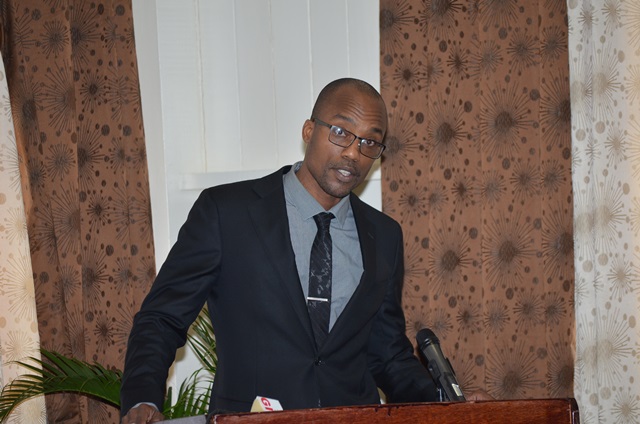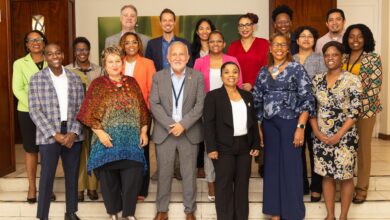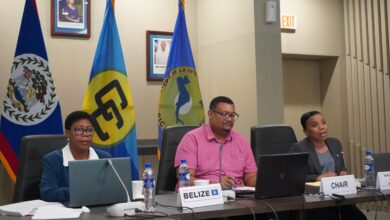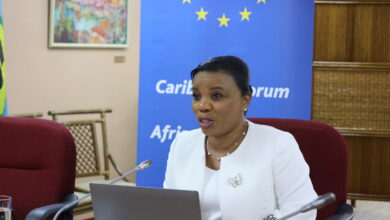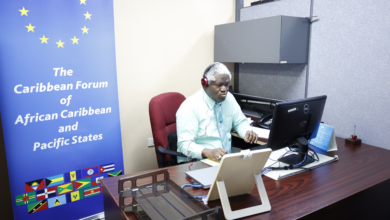Several local customs officers, as well as stakeholders in the public and private sector benefitted from a customs and trade facilitation capacity workshop, conducted today at the Guyana Revenue Authority (GRA.)
The workshop, held in the agency’s Training Room, at Camp Street, forms part of a slew of capacity building initiatives being implemented across the region, under the Caribbean Forum CARIFORUM–EU (European Union) Economic Partnership Agreement (EPA).
The training project was funded by the EU under the 10th EDF (Economic Development Fund) for capacity building within CARIFORUM states. It focuses not only on custom and trade facilitation, but also on areas relating to competition and public procedure.
Opening the workshop in Guyana were Commissioner-General (ag), GRA, Ingrid Griffith, Chairman of the entity’s Governing Board, Rawle Welch and Director, EPA Implementation Unit, Carlos Wharton.
The CARIFORUM EU Economic Partnership Agreement (EPA) was signed by 14 CARIFORUM states in October 2008, followed by Haiti in December 2009.
Wharton explained there has been the recognition of the need to build institutional capacity of CARIFORUM states to ensure the effective implementation of the agreement. This workshop forms part of this capacity building initiative, he said, and the training project is scheduled to unfold in under 27 months in the 15 CARIFORUM states.
Wharton explained that under the training project, a cross section of CARIFORUM stakeholders are being targeted in the private and public sector because they have responsibilities for the different thematic areas covered by the project.
He said the intention is to build human, legal and institutional capacity across the region in these three areas. The expected result from the overall project is that CARIFORUM states would be in a strengthened position to effectively honour their commitment and take advantage of the opportunities available under the EPA.
Following the signing of the EPA, there has been a range of new obligations under CARIFORUM that did not exist under the previous arrangement with the EU. These new responsibilities, Wharton noted require greater emphasis on measures placed on the border, and therefore the enhancement of customs and other officials’ skills is timely and necessary in order to ensure the effective application of these provisions.
Welch, in his remarks underscored the importance of custom and trade administration, the role that customs officers play in the enterprise and the impact that their work can have on it.
He observed that custom administration is a central contributory factor to the efficiency and cost of doing business, and as a consequence is a factor in the CARIFORUM states’ economic development.
“Every country needs to have an efficient and modern custom administration, one which allows a country to build friendly relationship and create the appropriate type of environment for the business community to ensure that our business sector could increase its competitiveness and at the same ensure that we can expand the welfare of the consumers and citizens of this country,” he said.
Observing that CARIFORUM economies are generally open and trade oriented, and that most of these economies are very dependent on the foreign trade sector (in the case of Guyana at least half of the Gross Domestic Product is a direct result of foreign trade activities), he explained that, “what we do at the custom entry is very important to what happens in our business environment and what happens in our household.”
He also noted the cost involved in custom and trade facilitation, pointing out that it requires the customs officials and workers to understand its importance so that importers, exporters and producers, “do not unnecessarily feel the brunt of our administration.”
He pointed out that for the CARIFORUM states to successfully implement the EPA’s obligations and to position themselves and the region to garner increased economic growth and to access stronger regional markets; their customs processes must be improved to satisfy three critical measures. He listed these as “speed, predictability and transparency”.
Meanwhile, Griffith described the workshop as a “win-win situation”, where everybody stands to gain from an initiative that will make the process of trade easier. The Commissioner-General (ag) observed that Government gains, because the workshop is expected to result in efficient procedures, in the process of moving goods, that will consequently lead to an increase in government revenue.
She noted that businesses gain because they will be able to deliver goods quicker to their customers, and the consumers gain since it is expected that the goods would be had at a much cheaper cost.
She commended the organisers of the training programme and encouraged each participant to raise awareness, and to share the information gathered with other officers and stakeholders.

